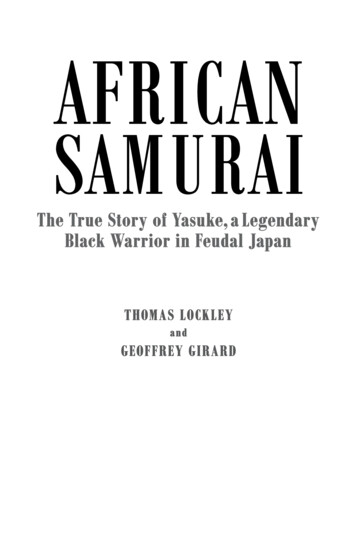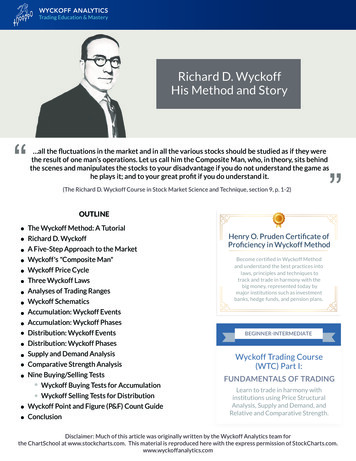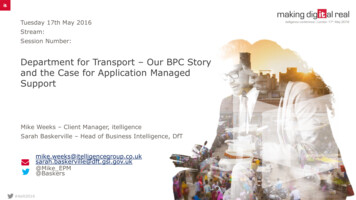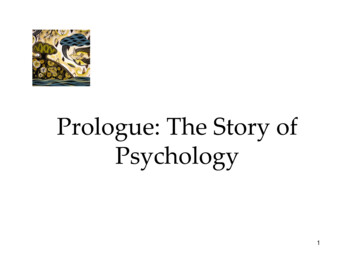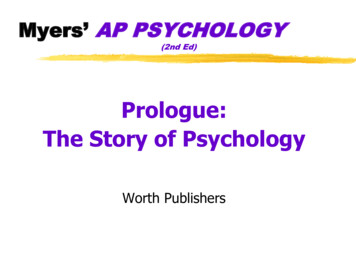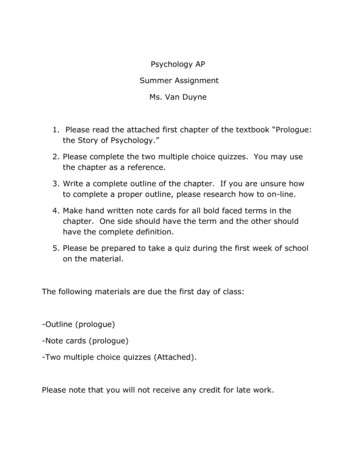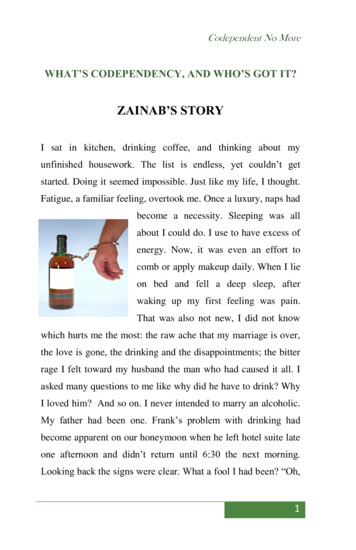
Transcription
Codependent No MoreWHAT’S CODEPENDENCY, AND WHO’S GOT IT?ZAINAB’S STORYI sat in kitchen, drinking coffee, and thinking about myunfinished housework. The list is endless, yet couldn‟t getstarted. Doing it seemed impossible. Just like my life, I thought.Fatigue, a familiar feeling, overtook me. Once a luxury, naps hadbecome a necessity. Sleeping was allabout I could do. I use to have excess ofenergy. Now, it was even an effort tocomb or apply makeup daily. When I lieon bed and fell a deep sleep, afterwaking up my first feeling was pain.That was also not new, I did not knowwhich hurts me the most: the raw ache that my marriage is over,the love is gone, the drinking and the disappointments; the bitterrage I felt toward my husband the man who had caused it all. Iasked many questions to me like why did he have to drink? WhyI loved him? And so on. I never intended to marry an alcoholic.My father had been one. Frank‟s problem with drinking hadbecome apparent on our honeymoon when he left hotel suite lateone afternoon and didn‟t return until 6:30 the next morning.Looking back the signs were clear. What a fool I had been? “Oh,1
Codependent No Moreno. he‟s not an alcoholic. Not him. “I had defended, time andagain. I had believed his lies as well as mine. I left him beforeand all I did was feel depressed, think about him, and worryingabout money. Damn me.I look at the clock it was quarter to three. The kids would behome soon from school and the he would be too, expectingsupper but nothing was done as it was his fault, I thought. Hisfault!Suddenly, I shifted emotional gears, and a chain of negativethinking aroused like maybe he had taken another woman tolunch or having an affair, maybe he had left early to drink.The phone rang, interrupting my anxiety. It was my neighbor, afriend. We talked and I told her about my day.“I am going to counseling tomorrow,” she said. “Want to comealong?”I had heard about Counseling. it was a group for people marriedto drunks. “I‟ll see,” I lied. “I‟ve got a lot of work to do,” Iexplained, not lying. Outrage poured through me, Of course Ididn‟t want to go to Counseling. I felt furious at the suggestionthat I do more and continue giving to this bottomless pit ofunmet needs we called a marriage. I was sick of shouldering theburden and feeling responsible for the success or failure of the2
Codependent No Morerelationship. It‟s his problem. Let him deal with it, leave me outof this. Make him better, and I will feel better.After I hung up the phone, I Dragged myself in to the kitchen tofix supper, thinking I am not the one who needs help, I thought. Ihaven‟t drunk, used drugs, lost job, and lied to and deceivedthose I loved. No, I decided, I‟m notirresponsible one. To the contrary, I‟ve beenresponsible for everything and everyone. Idon‟t need more guilt. Tomorrow, I‟d get upand get busy. Things will get bettertomorrow.When the kids came home, I found myselfhollering at them. That didn‟t surprise me or them. My husbandwas a nice guy, I was the bitch. Anger was always beneath thesurface. For so long, I had tolerated. I was always on defensive,and felt I was somehow, fighting for my life. Later I learned Iwas.By the time my husband came home, I had put disinterestedeffort into preparing supper. We ate, barely talking“I had a good day,” Frank said.“That‟s nice,” I said back.“How was your day?” he asked.3
Codependent No MoreHow in the hell do you think it was? I railed silently. After allyou have done to me. I flashed him daggers, forced a smile, andsaid, “My day was okay. Thanks for asking.” Frank looked away.He heard what I wasn‟t saying. We used to thrive on arguments,but we grew sick of them. So we did it silently.The children interrupted our hostile silence. Our son said hewanted to go to playground several blocks away. I said no, Ididn‟t want him to go without his father or me. I yelled hewasn‟t going, and that was that. He yelled please, I have to go.As usual I backed down. Okay, go but be careful, I warned. I feltlike I had lost. No one ever listen to me.I didn‟t take meseriously.After supper, I washed dishes while my husband watchedtelevision. As usual, I work, and you play. I worry and yourelaxed I care and you don‟t. I told him to rake the yard but herefused while saying I will do it later asit was really the man job, but later nevercame.Icouldn‟twait;Iwasembarrassed by the yard. When I said Iwas used to doing everything and Iwould do that too. He said okay. Oursexual life was damaged as sleeping with my husband hadbecome as strained as our waking moments.Either way, sexwas psychologically and emotionally unsatisfying. Long ago I4
Codependent No Morehad shut off my sexual desires. I had shut off my need to giveand receive love.I had expected so much of this marriage. I had many dreams forus, but none of them had come true, everything in this marriagehad become a trap. And I couldn‟t find the way out. Maybe, Ikept telling myself, it will get better, after all the problems arehis fault. He‟s an alcoholic. When he will get better our marriagewill get better too.He attended the alcoholics anonymous for six months. He wasgetting better but I wasn‟t. I was beginning to wonder. Whathappened to our love? What had happened to me?One month later, I began to suspect what I would soon learn wasthe truth. By then, the only thing that had changed was I feltworse. I had no purpose, except to care for other people, and Iwasn‟t doing a good job of that. I was stuck in the past andterrified of the future. Something dreadful, something that Icouldn‟t explain, had happened to me. I ruined my life.Somehow, I had been affected by his drinking, and the ways Ihad been affected had become my problems. It no longermattered whose fault it wasI had lost control.5
Codependent No MoreOTHER STORIESAmjad was a chemical dependency counselor and a recoveringalcoholic with several years of sobriety when he found himselfhaving troubles.Amjad was also an adult child of an alcoholic; his father andthree brothers were alcoholics. An intelligent, sensitive man whoenjoyed his work, Amjad‟s problem was his leisure time. Hespent most of it worrying about---- obsessed with----other peopleand their problems. Sometimes he tried to untangle messesalcoholics created; other times he felt angry with the alcoholicsfor creating the messes he felt obligated to clean up; sometimeshe felt upset because people, not necessarily alcoholics, behavedin particular ways. He ranted, felt guilty, sorry and used bypeople. Rarely, however, did he feel close to them. Rarely didhave fun.For many years, Amjad believed his duty was to worry aboutpeople and get involved in their problems. He called his behaviorkindness, concern, love and sometimes, righteous indignation.Now, after getting help for his problem, he calls it extricablyentangled with being a good wife, mother, husband, brother or6
Codependent No Moredaughter. Now in her forties, Rubina is an attractive woman---when she takes care of herself. Most of the time, however, she‟sbusy taking care of her five children and her husband, who is arecovering alcoholic. She devoted her life to making them happy,but she didn‟t succeed. Usually, she feels angry andunappreciated for her efforts, and her family feels angry at her.She spends too much of the family‟s budget on toys and clothingfor the children---- whatever they want. Most of the time, theydon‟t even say, “Thank you.” Rubina resents her constant givingto people in her life. She resents how her family and their needscontrol her life. She chose nursing as her profession, and sheoften resents that.“But I feel guilty when I don‟t do what‟s asked of me. I feelguilty when I don‟t live up to my standards for a wife andmother. I feel guilty when I don‟t live up to others people‟sstandards for me. I just plain feel guilty,” she said. “In fact,” sheadded, “I schedule my day, my priorities, according to guilt.”Does endlessly taking care of other people, resenting it, andexpecting nothing in return mean Rubina is a good wife andmother? Or could it mean Rubina is codependent?Co dependency is complex. Some people have extremely painfuland debilitating experience with codependency. Others don‟t andmay be only mildly affected.7
Codependent No MoreCODEPENDENCYRelationships are like a dance, with visible energyracing back and forth between the partners.Some relationships are the slow, dark dance ofdeath.The obvious definition would be: being a partner independency. This definition is close to the truth but still unclear.It brings no specific image to mind.WHAT’S CODEPENDENCY?In an article from the book Co-Dependency, An Emerging Issue,Robert Subby codependency is: “An emotional, psychological,and behavioral condition that develops asa result of an individual‟s prolongedexposure to, and practice of, a set ofoppressive rules---rules which preventthe open expression of feeling as well as the direct discussion ofpersonal and interpersonal problems.”Earnie Larsen, defines codependency as; “those self-defeating,learned behaviors or character defects that result in a diminishedcapacity to initiate or to participate in loving relationship.”8
Codependent No MoreSome therapists have proclaimed: “codependency is anythingand everyone is codependent.” So, who‟s got who inside story?A brief history of codependency will help answer this question.A BRIEF HISTORYThe word codependency appeared on the treatment scene in thelate seventies in Minnesota treatment center. Originally the wordCodependent was used to describe the person or persons whoselives were affected as a result of their being involved withsomeone who was chemically dependent. The codependentspouse or child or lover of someone who was chemicallydependent was seen as having developed a pattern of coping withlife that was seen having developed a pattern of coping with lifethat was not healthy, as a reaction to someone else‟s drug oralcohol abuse.It was a new name for an old game. Professionals had longsuspected something peculiar happened to the people who odependents certainly felt the effects of codependency longbefore the word was coined.In 1940‟s, after the birth of Alcoholics Anonymous, a group ofpeople----primarily wives of alcoholics formed self help, supportgroups to deal with the ways their spouses‟ alcoholism affectedthem. They wanted a program so they went for counseling.9
Codependent No MoreThe basic thought then, and in 1979 when the wordcodependency emerged, was codependent (co-alcoholics or paraalcoholics) were people whose lives had become unmanageableas a result of living in a committed relationship with analcoholic.However, the definition for codependency has expended sincethen. Professionals began to better understand the effect of thechemically dependent person on the family, and the effect of thefamily on the chemically dependent person. As professionalsbegan to understand codependency better, more groups of peopleappeared to have it.When a codependent discontinued his or her relationship with atroubled person, the codependent frequently sought anothertroubled person, the codependent behaviors with that newperson. The behaviors, or coping mechanisms, seemed to prevailthroughout the codependent‟s life----if that person didn‟t changethese behaviors.A codependent person is one who has let another person’sbehavior affected him or her, and who is obsessed withcontrolling that person’s behavior.10
Codependent No MoreCODEPENDENT CHARACTERISTICSMany professionals say the first step towards change isawareness. The second step is acceptance. With that in y.CARETAKING1. Think and feel responsible for other people‟s feelings,thoughts, actions, choices, wants, need, well being, lack of wellbeing, and ultimate destiny.2. Feel anxiety, pity and guilt when other people have a problem3. Feel compelled, almost forced, to help that person solve theproblem such as unwanted advice, giving a rapid dire series ofsuggestions or fixing feelings.LOW SELF WORTH1. Reject compliments or praise2. Feel different from the rest of the world3. Think they are not quite good enough.4. Take things personally.5. Think their lives are not worth living.11
Codependent No MoreREPRESSION1. Push their thoughts and feelings out of their awarenessbecause of fear and guilt.2. Become afraid to let themselves be who they are.3. Appear rigid and controlled.OBSESSION1. Feel terribly anxious about problems and people.2. Worry about the silliest things.3. Lose sleep over problems or other people‟s behavior4. Focus all their energy on other people and problems.CONTROLLING1.Think they know best how things should turn out and howpeople should behave.2.Try to control events and people through threats, advice giving,manipulation, or domination.DENIAL1. Ignore problems or pretend they are not happening.2. Pretend circumstances are not as bad as they are.3. Tell themselves things will be better tomorrow.4. Stay busy so they don't have to think about things.DEPENDENCY1.don't feel happy, content, or peaceful with themselves.12
Codependent No More2. Look for happiness outside themselves.3. feel terribly threatened by the loss ofanything or person they think provideshappiness.4. Don‟t love themselves.5. Lose interest in their own lives when they love.6. Tolerate abuse to keep people loving them.POOR COMMUNICATION1. Don't say what they mean.2. Don‟t mean what they say.3. Gauge their words carefully to achieve a desired effect.4. Try to say what they think will please people.WEAK BOUNDERIES1. Let others hurt them2. Keep letting people hurt them.LACK OF TRUST1. Don‟t trust themselves.2. Don‟t trust their feelings.3. Don‟t trust their decisions.4. Lose faith and trust in God.ANGER1. Feel very scared, hurt and angry.13
Codependent No More2. Are afraid of their own anger.3. Are frightened of other peoples anger4.Think people will go away if anger enters the picture.5. Are afraid to make other people feel angry.6. Repress their angry feelings.7. Cry a lot, get depressed, overeat, get sick, do mean and nastythings.PROGRESSIVE CHARACTISCTICSThere are some progressive characteristics of codependents likein the later stages of codependency; codependents may1.Feel lethargic, depressed, suicidal, hopeless, and violent.2. Experience a complete loss of daily routine and structure.3. Abuse or neglect their children and other responsibilities.4. Experience an eating disorder.5. Become addicted to alcohol or other drugs.SEX PROBLEMS1. Are caretakers in the bedroom?2. Have sex when they don‟t want to.3. Don‟t talk about it.4. Consider or have an extramarital affair.5. Make up reasons to abstain.6. Lose interest in sex.7. Reduce sex to a technical act.14
Codependent No MoreDETACHMENTMost codependents are attached to the people and problems intheir environment. By “attachment,” I don‟t mean normalfeelings of liking people, beingconcerned about problems, or feelingconnected to the world. Attachment isbecoming overly-involved, sometimeshopelessly entangled.Attachment can take several forms: We may become excessively worried about a problem orperson. Our emotional energy is directed at the object of ourobsession. Wemaybecomereactionaries, insteadofactingauthentically of our own violation. We may become emotionally dependent on the peoplearound us. We may become caretakers (rescuers, enablers) to thepeople around us (firmly attaching ourselves to their needfor us.Whenever we become attached in these ways to someone orsomething, we become detached from ourselves. We lose touch15
Codependent No Morewith ourselves. We forfeit our power and ability to think, feel,act and take care of ourselves. We lose control.In other words over involvement of any sort can keep us in astate of chaos; it can keep the people around us in a state ofchaos. If we are focusing all our energies on people andproblems, we have little left for the business of living our ownlives and there is just so much worry and responsibility in the air.It is in fact a wasted energy which we focus on other people.We cannot begin to work on ourselves until we have detachedfrom the object of our obsession. Detachment is not a coldhostile withdrawal. Detachment is base on the premises that eachperson is responsible for himself, that we can‟t solve problemsthat aren‟t ours to solve, and that worrying doesn‟t help. Weadopt a policy of keeping our hands off others people‟sresponsibilities and tend to our own instead.Detachment involves “present moment living”. We allow life tohappen instead of forcing and trying to control it. Detachingmeans we learn to love, care be involved without going crazy.Sometimes detachment even motivates and frees people aroundus to begin to solve their problems. Detachment is both an actand an art. It is a healthy way of life I believe it is also a gift andit will be given to those who seek it.16
Codependent No MoreFor the practical implication of detachment Counseling suggestsa three-part formula called HOW. In HOW Formula:H: stands for honestyO: stands for opennessW: stands for willingness to tryHonesty; means there is only a need of being honest with oneselfand accepting the fact that we being human beings have somelimitations. We can‟t be perfect in solving other people‟sproblems. So there is no need to be crazy and spoiling one‟s ownlife at the expense of others.Openness; means we should always welcome other people‟sthoughts and opinions and be open to express our own truefeelings and thought about them. Instead of being scared to thefact that if we shall express our true feelings; we shall lose ourobject of obsession or the person we love.Willingness to try; is the ability to accept ones strengths andweakness and strive for finding ones individual potential ratherthan finding happiness and magic in others.HOW formula suggests that with a little humility, surrender andeffort on our part we can strive for detachment.17
Codependent No MoreDON’T BE BLOWN ABOUT BY EVERYWINDMost codependents are reactionaries. They react with anger,guilt, shame, self-hate, worry, hurt,controlling gestures, caretaking act,desperation, and fury. They reactwith fear and anxiety. It is normalto react and respond to ourenvironment. Reaction is part of life. It‟s part of interaction. It‟spart of being alive and human. But we allow ourselves to get soupset, and so distracted. Little things, big things, anything, havethe power to throw us off the track. And the way we react isfrequently not in our best interest.Codependents basically have a self destructive reactionarypattern. Like they think that if someone does something, so wemust does something back. If someone says something, so wemust say something back. Someone feel a certain way, so wemust feel a certain way.They Simply Jump Into The First Feeling That Comes Their WayAnd Then Wallow In It.18
Codependent No MoreSome suggestions follow to help you detach from people andyour destructive reactions to them.1. Learn to recognize when you are reacting; usuallywhen you start to feel anxious, afraid, indignant, outraged, rejected, sorry for yourself, ashamed, worried, orconfused, something in your environment has snaggedyou.2. Make yourself comfortable; when you recognize thatyou are in the midst of a chaotic reaction, do whateveryou need to do to help yourself relax. Take a few deepbreaths. Go for a walk. Clean the kitchen. Go for shower.Go to a friend‟s house.3. Examine what happened;if the problem is serious, or isseriously upsetting you, you may want to discuss it witha friend to help clear your thoughts and emotions.Troubles and feeling go wild when we try to keep bility for them. Deal with it. Then tell yourselfthe truth about what happened.4. Find out what your need to take care of yourself;make your decisions based on reality, and make themfrom a peaceful state. Do you need to have a heart-to –heart talk with someone? Do you need to make someother decision to take care of yourself? When you makeyour decision keep in mind what your responsibilitiesare.19
Codependent No MoreSET YOURSELF FREEPeople say codependents are controllers they are the people whoconsistently, and with a great deal of effort and energy, try toforce things to happen. They do so in the name of love They do it so as they say “we are onlytrying to help” They do it because they think theyknow best how things should go andhow people should behave.Controlling is an illusion. It doesn‟t work. We cannot controlalcoholism. We cannot control any one‟s compulsive behaviorslike overeating, smoking or any of their behavior. We cannotcontrol anyone‟s emotions, minds or choices; we cannot controlthe outcome of events. We cannot control life. Some of us canbarely control ourselves.People ultimately do what they want to do. They feel how theywant to feel (or how they are feeling); they think what they wantto think; they do the things they believe they need to do; and theywill change only when they are ready to change.20
Codependent No MoreWe cannot change people. Any attempt tocontrol them is just an illusion. People willeither resist our efforts or redouble their effortsto prove we can‟t control them. They maytemporarily adapt to our demands, but themoment we turn our backs they will return totheir natural state.Furthermore, people will punish us for making them dosomething they don‟t want to do, or be something they don‟twant to be .No amount of control will effect a permanent ordesirable change in another person. We just need to understandthatThe Only Person You Can Ever Change Is Yourself. The OnlyPerson Your Business To Control Is Yourself.When you have done all that you can do, it is time to detach.Deal with your feelings. Gain control of yourself and yourresponsibilities. Free other s to be who they are. In so doing, youwill set yourself free.21
Codependent No MoreREMOVE THE VICTOMThe underlying theme of this rule is that there is no need ofpursuingunnecessaryactsofrescuing and care taking becausethrough such acts one becomesvulnerable to be the victim oftroubled person‟s aggression ormisuse.Codependents are caretakers rescuers. They rescue, then theypersecute, then they end up victimized. For codependents “yourwish is my command” and “your problem is my problem” is thetheme of life. They are the caretakers.WHAT IS A RESCUE?Rescuing and caretaking mean almost what they sound like. Werescue people from their responsibilities. We take care ofpeople‟s responsibilities from them. Later we get mad at them forwhat we‟ve done. Then we feel used and sorry for ourselves.That is the pattern, the triangle.Rescuingandcaretakingaresynonymous. Their definitions areclosely connected to enabling.Enabling is a therapeutic jargonthat means a destructive form of helping. Any acts that help an22
Codependent No Morealcoholic continue drinking, prevent the alcoholic from sufferingconsequences ,or in any way make it easier for an alcoholic tocontinue drinking are considered enabling behaviors.As counselor Scott Egleston says, we rescue anytime we takeresponsibility for another human being –for that person‟sthoughts, feelings, decisions, behaviors, well being, problems, ordestiny.The following acts constitute a rescuing or caretaking move: Doing something for someone although that person iscapable of and should be doing it for him or herself. Meeting people‟s needs without being asked and beforewe‟ve agreed to do so. Doing more than a fair share ofwork after our help is requested. Consistently giving more than we receive in a particularsituation. Speaking for another person Suffering people‟s problem s for them.Caretaking breeds anger. Caretakers become angry parents,angry friends, and angry lovers. Giving to and doing things forand with people are essential parts of healthy living and healthyrelationships. But learning when not to give, when not to give in,and when not to so things for and with people are also essentialparts of healthy living and healthy relationships.23
Codependent No MoreCare taking is an act and an attitude .but when it becomes a rolean approach to our entire lives and to all the people around us webecome codependents. There is a thin line between beneficialcare giving and destructive giving and in order to be relieved, weneed to learn to make thatdistinction.Henceoneought to be a caregiver nota care takerWe can learn to recognize a rescue. Refuse to rescue. Refuse tolet people rescue us. Take responsibility for ourselves, and letothers do the same. Whether we change our attitudes, ourcircumstances, our behaviors, or our minds, the kindest thing wecan do is remove the victims ourselves.24
Codependent No MoreUNDEPENDENCEA married woman had assumed all the responsibilities for raisingher two children, and did all the householdchores. „‟I want to separate from myhusband,” she sobbed. “I can‟t stand him orhis abuse any longer. But tell me; please tellme,‟‟ She asked, “Do you think I can takecare of myself?”The words vary, but the thought is the same. “I‟m not happyliving with this person, but I don‟t think I can live without him(or her). I cannot, for some reason, find it within myself to facethe aloneness that every human being must face or continue torun from: that of being ultimately and solely responsible fortaking care of myself. Whether codependence appears fragile andhelpless, or sturdy and powerful, most of us are frightened,needy, vulnerable children who are aching and desperate to beloved and cared for.This child in us believes we are unlovable and will never find thecomfort we are seeking. Sometimes this vulnerable childbecomes too desperate. People have abandoned us, emotionallyand physically. People have rejected us. People have abused us,let us down. People have never been there for us; they have not25
Codependent No Moreseen, heard, or responded to our needs. We may come to believethat people will never be there for us. For many of us, even Godseems to have gone away.We have been there for so many people. Most of us desperatelywant someone to finally be there for us.We need someone, anyone, to rescue usfrom the stark loneliness, alienation, andpain. We want some of the good stuff,and the good stuff is not in us. Pain is inus. We feel so helpless and uncertain.Others look so powerful and assured. We conclude the magicmust be in them.So we become dependent on them. We can become dependent onlovers, spouses, friends, parents, or our children. We becomedependent on their approval. We become dependent on theirpresence. We become dependent on their need for us. Webecome dependent on their love, even though we believe we willnever receive their love; we believe we are unlovable andnobody has ever loved us in a way that met our needs.Needing people so much, yet believing we are unlovable andpeople will never be there for us, can become a deeply ingrainedbelief. Sometimes, we think people are not there for us when26
Codependent No Morethey really are. Our need may block our vision, preventing usfrom seeing the love that is there for us.Many of us expect and need other peopleso much that we settle for too little. Wemay become dependent on troubledpeople, alcoholics and other people withproblems. Sometimes, we need people so badly we settle fornearly anyone. We may even convince ourselves that we can‟tlive without someone and will wither and die if that person is notin our lives. If that person is alcoholic or deeply troubled, wemay tolerate abuse and insanity to keep him or her in our lives, toprotect our source of emotional security.People who feel trapped look for escapes. Codependents whofeel stuck in a relationship may begin planning an escape.Sometimes our escape route is a positive, healthy one; we begintaking steps to become undependent, financially and emotionally.“Undependence” is a term Penelope Russian off uses in her bookto describe that desirable balance wherein we acknowledge andmeet our healthy, natural needs for people and love, yet we don‟tbecome overly or harmfully dependent on them.We may go back to school, get a job, or set other goals that willbring freedom. And we usually begin setting those goals whenwe are sick enough of being trapped. Some codependents,27
Codependent No Morehowever, plan destructive escapes. We may try to escape ourprison by using alcohol or drugs. We may become workaholics.We may seek escape by becoming emotionally dependent onanother person who is like the person we were attempting toescape, another alcoholic, for example.Ultimately, too much dependency on a personcan kill love. Many of us learned these thingsbecause when we were children, someone veryimportant to us was unable to give us the love,approval, and emotional security we needed.So we gone about our lives the best way we could, still lookingvaguely or desperately for something we never got. Some of usare still beating our heads against the cement trying to get thislove from people who, like mother or father, are unable to givewhat we need. The cycle repeats itself until it is interrupted andstopped. It s called unfinished business.Somewomenweretaughttobedependent. They learned to center theirlives on other people and to be taken careof. Even since the women s liberationmovement, many women, deep inside,fear being alone. Many people, not justwomen, fear being alone and taking care of them. It is part ofbeing human.28
Codependent No MoreSome of us may have entered an adult relationship with ouremotional security intact, only to discover we were in arelationship with an alcoholic. Nothing will destroy emotionalsecurity more quickly than loving someone who is alcoholic orhas any other compulsive disorder. Their diseases demand us tocenter our lives on them. Confusion, chaos, and despair reign.Even
Codependent No More 8 CODEPENDENCY Relationships are like a dance, with visible energy racing back and forth between the partners. Some relationships are the slow, dark dance of death. The obvious definition would be: being a partner in dependency. This definition is close to the truth but still uncle


